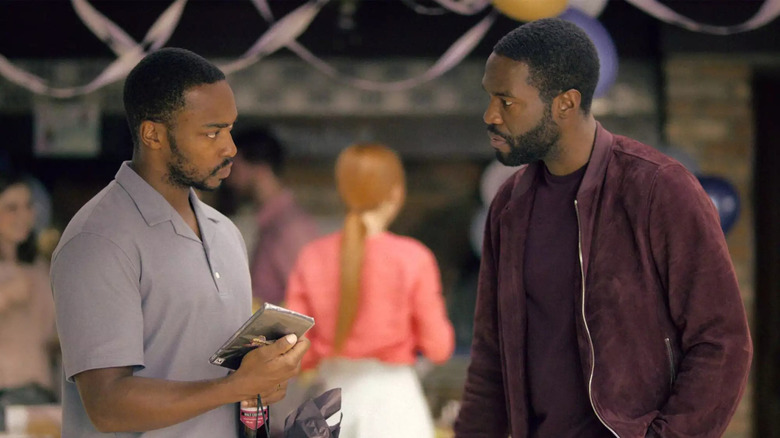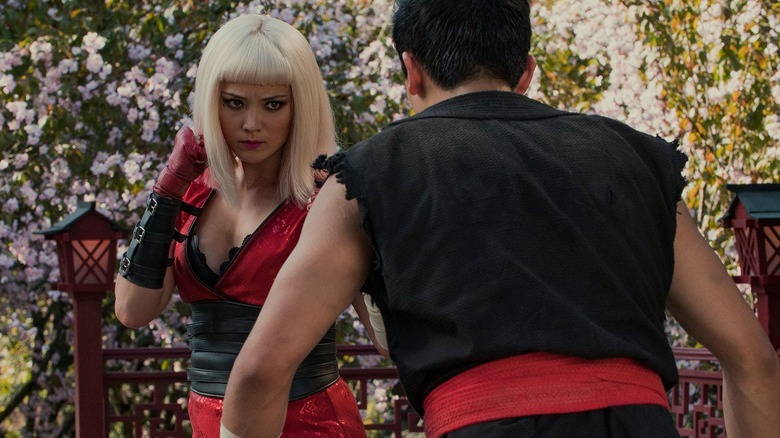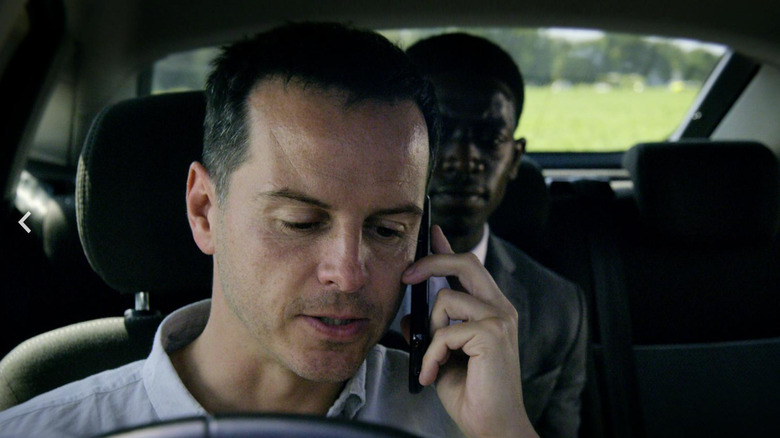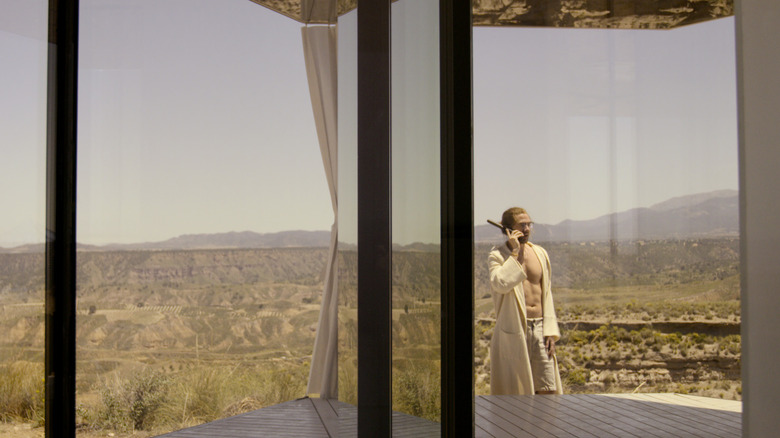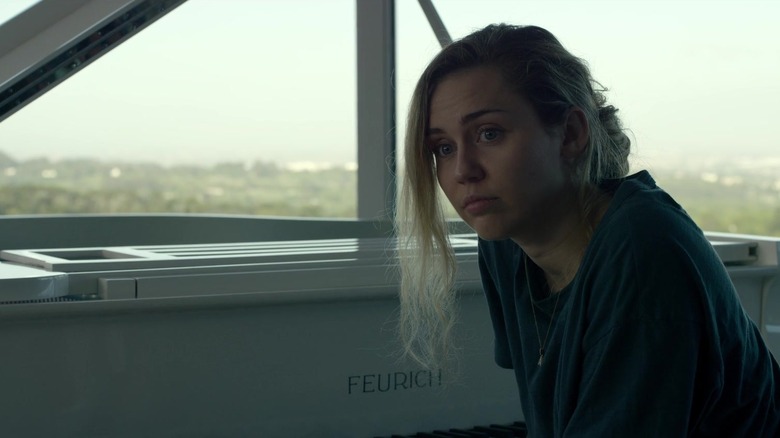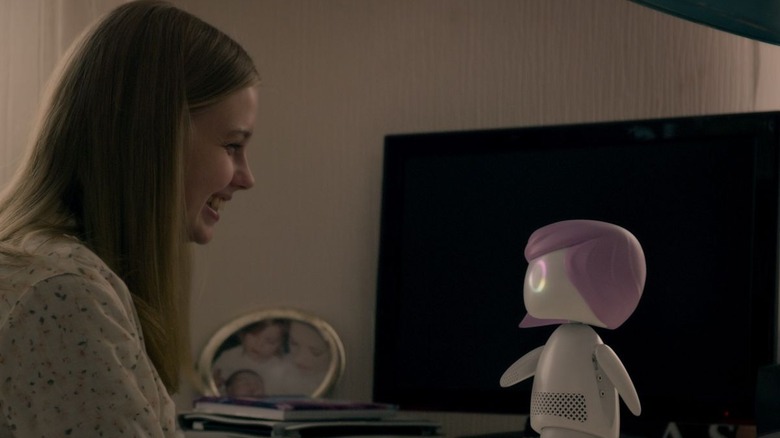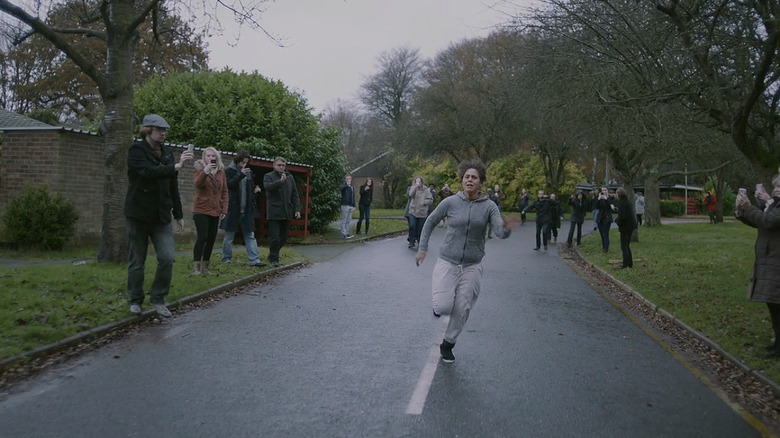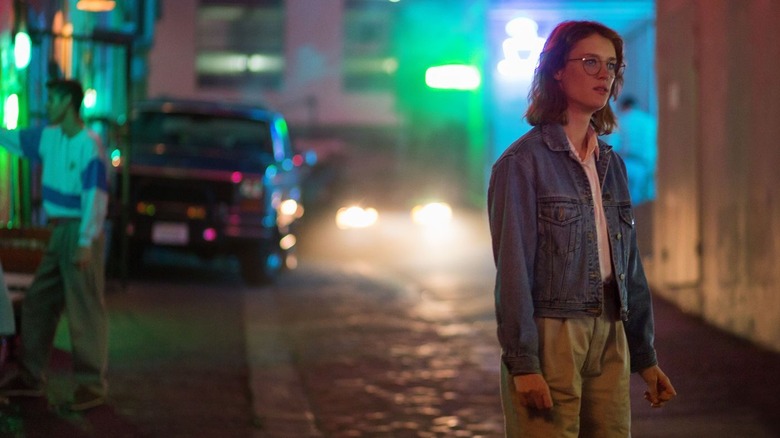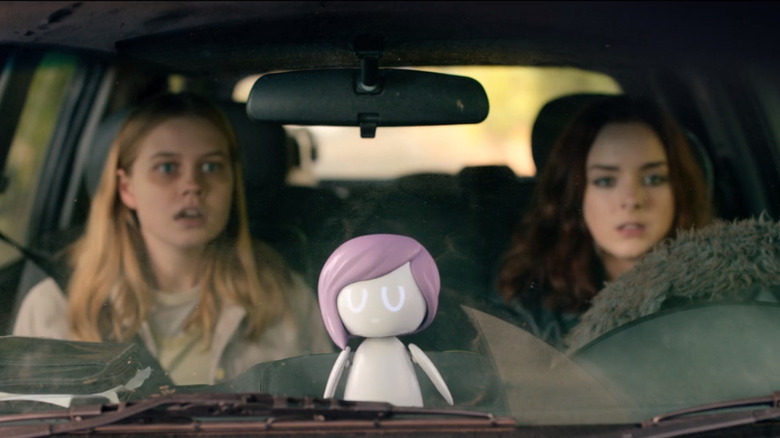Why Season 5 Of Black Mirror Is Better Than You Remember
After a lot of behind-the-scenes complications, "Black Mirror" is officially returning for a sixth season on Netflix. Now that fans have something to look forward to again, it's worth looking back on the show's most widely-derided string of episodes: season 5. The season started off with "Striking Vipers," an episode whose biggest claim to fame was the "I f**ked a polar bear" line. This was followed by "Smithereens," an episode that most people considered entertaining, but whose message was often conflated to nothing more than a "don't text and drive" PSA. This was followed by "Rachel, Jack and Ashley Too," which is widely considered to one of the weakest episodes of the show's run. It's even ranked below "The Waldo Moment" on IMDb, which is a tough feat to pull off.
Perhaps the most damning aspect of season 5 to a lot of viewers was the lack of the show's famous darkness and cynicism. Whereas the first two pre-Netflix seasons of the show were made up of episodes that all ended on a dark note, "Black Mirror" started experimenting with happier endings after being bought by Netflix in season 3. Although season 4 featured two of the darkest episodes in the whole show — "Black Museum" and "Crocodile" — some of the other four installments lacked that queasy, need-to-take-a-shower feeling that "Black Mirror" is great at evoking. Season 5 continued with the trend, as even the darkest episode of the three only implied the tragic ending.
Despite all this, I'd argue that season 5 is a great collection of "Black Mirror" episodes. Not only that, but it might actually be the most consistently strong season in the show's run. Every season of "Black Mirror" has had at least one weak-link episode, but not this one.
Striking Vipers
Like plenty of good episodes of this show, "Striking Vipers" takes a technology that already sort of exists in the modern day and takes it to its natural endpoint: If technology exists that allows people to truly feel like they're in a different world, in a different body, eventually people are going to use it to have sex. But the episode doesn't stop there, as this technology also allows you to experience realistic sex in a different body, which leads to a lot of open-ended questions when the main character Danny (Anthony Mackie) ends up having an ongoing affair with Karl (Yahya Abdul-Mateen II), with Karl being in the body of a woman. The line between watching porn and having an affair is blurred here, just as trying to pinpoint either of these characters' sexualities feels increasingly impossible.
What results is an episode that's undoubtedly a little weird, but also one of the most creative and thought-provoking hours of TV the show has produced. It creates a situation where there's truly no easy answer to resolve things, and the show doesn't try to give you one. It makes you sympathize with Danny's dilemma while never letting him off the hook for neglecting his wife, and resolves things on a note that isn't clearly happy or sad. Whether the arrangement between Danny and Theo (Nicole Beharie) will work out long-term is entirely up to you to decide, and there's plenty of evidence to support either side of that debate.
Smithereens
"Smithereens" may be the most widely acclaimed episode of the season, but it's also the one most commonly hit with the accusation that the social commentary of the show is often just "phones bad," rather than anything substantial. The episode is all about how the social media companies that collect our data are, in a way, more powerful and knowledgeable than any actual government. And like with a government, its flaws are so systemic that even though none of the characters we see involved with the company Smithereen are evil, they all seem pretty powerless to fix anything. Even the guy who created the social media platform (Billy Bauer, played memorably by Topher Grace) sees its issues as out of his hands.
Chris (Andrew Scott) gives an emotional monologue in the episode's climax explaining his full motivations: He was looking at the addictive Smithereen app on his phone while driving and got in an accident that killed his fiancé. It's a moment that threatens to feel like we're watching a standard PSA on texting and driving, but it's hardly the main message of the story. The story is about the frustration of an individual dealing in vain with a systemic issue, even as he understands that sacrificing everything he has likely won't be enough to make even the tiniest different on a large scale.
Settling for a small-scale win
"Smithereens" ends with one of the snipers shooting and killing someone in the car. Was it Chris they shot, or the innocent, sympathetic hostage Jaden (Damson Idris)? We never find out. Instead, we're treated to a credits montage of people around the country getting an update on their phones about what happened, shrugging, and going back to life.
At first glance, it seems like a simple commentary on how social media desensitizes us to real-life tragedy. This event that seemed so important to us is just another thing to scroll through on these people's social media feeds. Critics and fans often point to this ending as being a commentary on society's collective apathy, but I think that's selling the episode short. Because honestly, what were those people shrugging at the news update on their phone supposed to do instead? Something horrible on this scale (or worse) happens in the world multiple times a day; you can't realistically expect people to cry or spur into action that often.
Rather, the episode's about accepting that you as an individual can't fix a systemic problem alone, but you can make a difference to those close to you. This is shown when Chris manages to get Hayley (Amanda Drew) the password to her deceased daughter's Smithereen account, to help her find some closure. Chris' self-destructive quest may have cost him (or Jaden) his life and he didn't make a meaningful impact on the larger world, but he did manage to help this one person. Whether it was worth it or not is up to you.
Rachel, Jack and Ashley Too
"Just skip this one. It's just cringe," reads the most helpful-rated review on this episode's IMDb page. "And lacks all the interesting social commentary many previous [Bl]ack [M]irror episodes defined so well. Oh whoop de doo.. The music industry is a corrupt pile of crud... Really insightful." The critics weren't much kinder either, with this review by Newsday representing a common sentiment: "It's a little bit of slapstick, a little bit of drama, all wrapped in a few broad messages about predatory music industry marketing practices."
On one hand, it's clear why this episode has drawn so much ire: with its parodying of Disney teen dramas and its perhaps-too-easily-accomplished happy ending, it doesn't really feel like "Black Mirror." Tonally it lacks that familiar stomach-sinking feeling we've all come to expect, but the common refrain that the episode has no substance, that it lacks anything to say beyond "music industry bad," feels strange. This episode isn't subtle about critiquing the way the music industry eats young stars alive, but it also serves as a larger examination of the way we think about artists of any sort.
The first half of the episode features both Jack (Madison Davenport) and Rachel (Angourie Rice) dehumanizing Ashley (Miley Cyrus) in two different ways; Jack dismisses her as a corny sell-out while Rachel idolizes her to God-like status, to the point where she's basing her real-life decisions on what the corporate-sanitized Ashley O robot tells her to do. It's not until they get rid of the filter on the robot that either of them start to see Ashley as she really is.
Commentary on fan entitlement
The episode's writers seemed to anticipate the way fans would react to it, which is why it includes the meta element of depicting Ashley as feeling typecast, only being allowed to play one specific genre of music even as she yearns to try something new. "Rachel, Jack and Amy Too" does something fresh for "Black Mirror" with its genre, and much like the crying teenage fans who claimed to love Ashley but stormed out of her rock concert at the end, this episode sent its fans declaring the show had lost its way. But as the episode ends with Ashley defiantly singing the music she wants even as it turns some fans off, it feels like the "Black Mirror" writers' room telling the section of the audience that only comes for the hyper-tragic "White Christmas" kinds of episodes, "Yes, we also want to tell these types of stories. Deal with it."
There's a lot being said in this episode about the inevitable conflict between the art and the artist, and the way that technology has worsened our tendencies to treat artists as nothing more than vessels for content. But in part because the story is centered around teenage girls and filled with homages to Disney teen movies and shows, most of its subtext seems to have been lost or flattened, far more so than the rest of the newer seasons. A story about the complexities of celebrity culture and the way young people respond to it is simplified to "music industry bad." If you only look at something on the surface level, you're going to miss out when the text actually does have something going on beneath the surface.
Do the new stories really lack depth?
"Black Mirror" has always had to deal with critics over-simplifying its themes and then bashing on the show for being over-simplified. One of the more blatant examples was when a Vulture ranking of the show's episodes reduced the ending of "White Bear" to "a simplistic twist that pulls a switcheroo and fails to do much else. 'The good guy was the bad guy all along!'"
It's not uncommon to see people take that episode — which critiques the blurred line between enacting justice and engaging in socially acceptable sadism, as well as questioning how much of a person remains when you take away their memory — and reduces it to "good guy bad."
But it's the later, post-Netflix seasons in particular that seem to be most subjected to this kind of lazy-feeling criticism. The critique of the capitalist pulling-yourself-up-by-your-bootstraps narrative in "Nosedive" gets reduced to "social media bad," just as the contemplations on gender, sexuality, cheating and monogamy in "Striking Vipers" is reduced to "no homo." The season 5 opening episode is all about embracing the messy, complicated realities of being human and how advancing technology will allow us to explore a major aspect of human nature on a whole new level — for better or worse. But instead of delving into whether the show does a good or bad job handling these themes, a lot of the discourse seemed more content to joke around and talk about whether or not the two main characters technically qualify as gay.
From Channel 4 to Netflix
When it comes to the oversimplification of recent episodes, a lot of it seems to boil down to the perceived changes that occurred after the series was bought by Netflix. Instead of episodes ending with a character being tortured for an eternity, season 5 tended to end its episodes on a more low-key note. The fact that this trend began around the time Netflix bought the show only adds to the idea that this production change — and the increasingly American feel of the show in general — has caused "Black Mirror" to lose what made it so special in the first place. It's an attitude that feels similar to the widespread idea that the New York Times ruined Wordle, despite the fact that there hasn't yet been any meaningful change in the gameplay.
Going into season 3, "Black Mirror" had a higher budget, was more often set in America, and the larger number of episodes per season inevitably meant there was a higher chance of misses. But all in all, Netflix mostly seemed to just let Charlie Brooker and executive producer Annabel Jones do their things. When asked about the difference between Netflix and traditional TV, Brooker explained:
I'd say it's not hugely different. Practically, there are a couple of liberating things. One is you don't feel beholden to ratings. Often in broadcast television you worry that maybe there's going to be a football match on the other side. It feels like you get one shot to make an impression.
Give it another chance
Netflix gave them the creative freedom to tell exactly the kind of stories they wanted to tell, without being forced to adhere to limiting standard TV constraints. The surprisingly light-hearted "San Junipero" episode, for instance, was one conceived and written independently of any sort of studio note from Netflix. By all accounts it was a genuine creative choice on the part of the creators, not an indicator of the show falling prey to Hollywood's more sanitized, punch-pulling sensibilities. According to Brooker:
"That was the first one written for this season, so I was thinking: what are people going to expect? I've also become a bit more confident about writing. One thing people said about the show was that they liked it, but it was so f**king depressing: every week a guy finds an app that kills him. I thought, what's a more hopeful take?"
And with real life being a waking nightmare, it should be nice to be able to go into a "Black Mirror" episode with hope that it won't leave you feeling total despair about the state of the world. Season 6 could start off with a happy episode, a dark episode, or anywhere in between. After season 5 the bets are off, and shouldn't that be considered an improvement?
Although you can argue that the later season episodes are often too long for their own good (fair), or that you simply prefer the darker storytelling of the earlier seasons, please go ahead and give season 5 another try. You may be surprised at how well each episode holds up on re-watch, and by how much thematic weight they carry despite their reputation. The ambivalence over "Black Mirror's" return isn't warranted; season 5 makes it clear the show is still going strong.
